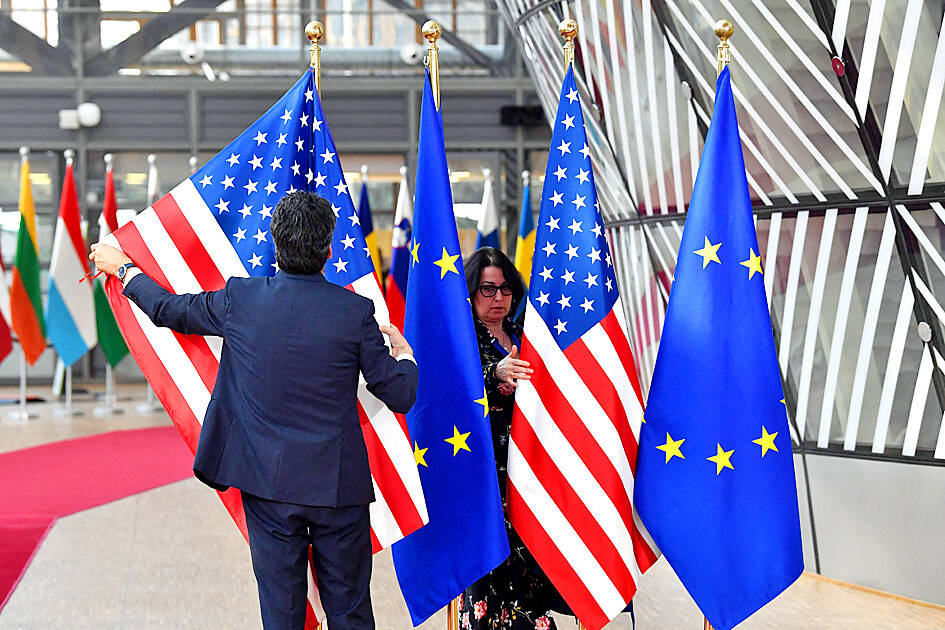The US and the EU on Friday announced an agreement to enhance the use of artificial intelligence (AI) to improve agriculture, healthcare, emergency response, climate forecasting and electricity grids.
A senior US administration official, discussing the initiative shortly before the official announcement, called it the first sweeping AI agreement between the US and Europe. Previously, agreements on the issue had been limited to specific areas such as enhancing privacy, the official said.
AI modeling, which refers to machine-learning algorithms that use data to make logical decisions, could be used to improve the speed and efficiency of government operations and services.

Photo: AFP
“The magic here is in building joint models [while] leaving data where it is,” the official said. “The US data stays in the US and European data stays there, but we can build a model that talks to the European and the US data, because the more data and the more diverse data, the better the model.”
The initiative should provide governments greater access to more detailed and data-rich AI models, leading to more efficient emergency responses and electricity grid management, along with other benefits, the official said.
Regarding power grids, the US collects data on how electricity is being used, where it is generated and how to balance a grid’s load so that weather changes do not knock it offline, the official said.
Many European countries have similar data points they gather relating to their own grids, the official said.
Under the new partnership, all of that data would be harnessed into a common AI model to produce better results for emergency managers, grid operators and others relying on AI to improve systems.
Meanwhile, Sciences Po, one of France’s top universities, has banned the use of ChatGPT, an AI-based chatbot that can generate coherent prose, to prevent fraud and plagiarism.
ChatGPT is a free program that generates original text about virtually any subject in response to a prompt, including articles, essays, jokes and poetry, raising concerns across industries about plagiarism.
The university said on Friday the school had e-mailed all students and faculty announcing a ban on ChatGPT and all other AI-based tools.
“Without transparent referencing, students are forbidden to use the software for the production of any written work or presentations, except for specific course purposes, with the supervision of a course leader,” Sciences Po said, without specifying how it would track usage.
ChatGPT has been banned in some public schools in New York City and Seattle, US media have reported, while several US universities have announced plans to assign fewer take-home projects and assign more hand-written essays and oral exams.

POWERING UP: PSUs for AI servers made up about 50% of Delta’s total server PSU revenue during the first three quarters of last year, the company said Power supply and electronic components maker Delta Electronics Inc (台達電) reported record-high revenue of NT$161.61 billion (US$5.11 billion) for last quarter and said it remains positive about this quarter. Last quarter’s figure was up 7.6 percent from the previous quarter and 41.51 percent higher than a year earlier, and largely in line with Yuanta Securities Investment Consulting Co’s (元大投顧) forecast of NT$160 billion. Delta’s annual revenue last year rose 31.76 percent year-on-year to NT$554.89 billion, also a record high for the company. Its strong performance reflected continued demand for high-performance power solutions and advanced liquid-cooling products used in artificial intelligence (AI) data centers,

SIZE MATTERS: TSMC started phasing out 8-inch wafer production last year, while Samsung is more aggressively retiring 8-inch capacity, TrendForce said Chipmakers are expected to raise prices of 8-inch wafers by up to 20 percent this year on concern over supply constraints as major contract chipmakers Taiwan Semiconductor Manufacturing Co (TSMC, 台積電) and Samsung Electronics Co gradually retire less advanced wafer capacity, TrendForce Corp (集邦科技) said yesterday. It is the first significant across-the-board price hike since a global semiconductor correction in 2023, the Taipei-based market researcher said in a report. Global 8-inch wafer capacity slid 0.3 percent year-on-year last year, although 8-inch wafer prices still hovered at relatively stable levels throughout the year, TrendForce said. The downward trend is expected to continue this year,

Vincent Wei led fellow Singaporean farmers around an empty Malaysian plot, laying out plans for a greenhouse and rows of leafy vegetables. What he pitched was not just space for crops, but a lifeline for growers struggling to make ends meet in a city-state with high prices and little vacant land. The future agriculture hub is part of a joint special economic zone launched last year by the two neighbors, expected to cost US$123 million and produce 10,000 tonnes of fresh produce annually. It is attracting Singaporean farmers with promises of cheaper land, labor and energy just over the border.

US actor Matthew McConaughey has filed recordings of his image and voice with US patent authorities to protect them from unauthorized usage by artificial intelligence (AI) platforms, a representative said earlier this week. Several video clips and audio recordings were registered by the commercial arm of the Just Keep Livin’ Foundation, a non-profit created by the Oscar-winning actor and his wife, Camila, according to the US Patent and Trademark Office database. Many artists are increasingly concerned about the uncontrolled use of their image via generative AI since the rollout of ChatGPT and other AI-powered tools. Several US states have adopted